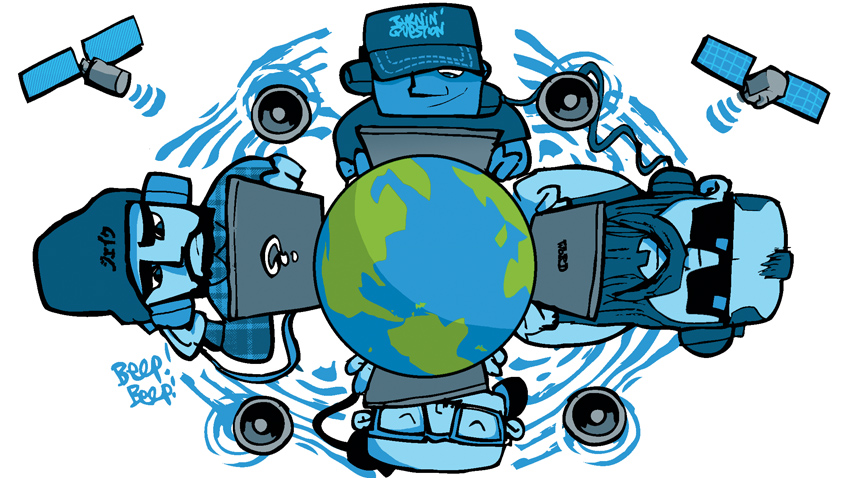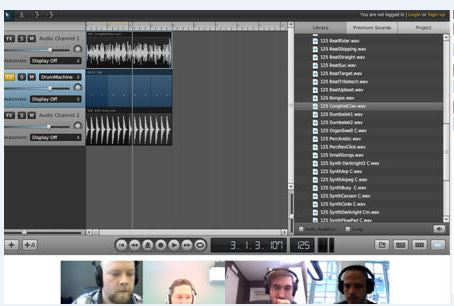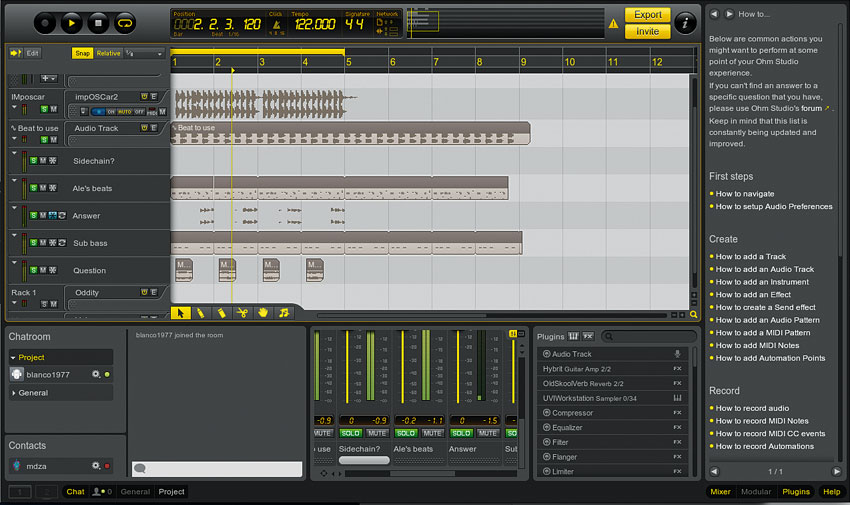Is computer music making becoming more social?
We discuss the impact of online collaboration and sharing

It's fair to say that one of the main reasons that many of us got into computer music making in the first place was because it stopped us having to rely on other people With a PC or Mac, a DAW and a bundle of software instruments, you don't need to worry about finding drummers, guitarists, bassists or keyboard players (delete as applicable) to play on your projects - instead, you can get the job done yourself.
However, there's something in the air right now that suggests that maybe - just maybe - computer musicians might be about to remember en masse that there is a big wide world out there and, y'know, actually start talking to and collaborating with other people. As you might expect, it's the internet that's driving this potential change in our thinking, but are we really ready to come out of the darkness and get a bit more social with our music making?
Making connections
One person who's hoping that we are is Bil Bryant of PowerFX, developer of online DAW Soundation. This was recently updated to work with Google+ Hangouts, so what are the key benefits for musicians? "Soundation for Hangouts allows up to nine people to work on the same version of Soundation Studio in real time while seeing and talking to each other over the internet," Bryant explains.

We can certainly see the appeal of working in this way but, as long-standing computer musos will tell you, we've been here before. Over the past ten or 15 years, there have been countless attempts to create 'global studio' platforms, but none of them have really gained much traction. So, why might Soundation succeed where others have failed?
"A couple of reasons: [in the past] the technology wasn't quite there yet, and the focus was on the high-end professional, (eg, a producer in London recording a singer in Los Angeles)," says Bryant. "We are focusing on entry- and mid-level users learning and creating digital music together, with the social aspect being a very important part of the experience."
French developer Ohm Force is also a big advocate of online collaboration, and its long-awaited Ohm Studio DAW, which installs on local machines but enables you to work with other musicians 'in the cloud', was finally released as a finished product in October. When discussing inspiration for the project, Ohm Force's Grégory Makles cites the social side of gaming as a big influence.

"Back in 2000, we [Ohm Force] were a mix of gamers and musicians - I was both myself," says Makles. "When you play Duke Nukem and make music, it doesn't take a lot to wish you could enter a musical project in the same way you join an online game.
Want all the hottest music and gear news, reviews, deals, features and more, direct to your inbox? Sign up here.
"From there the other key decision was to make Ohm Studio cloud-based rather than just connecting users through LAN. This was way more difficult, but we thought it was the only way to offer the kind of solid, simple and consistent experience that we already knew was mandatory for success in the gaming world."
Share and share alike
You could certainly argue that music makers have been slower than other types of computer user to embrace the possibilities of working/ playing together, but with social networks such as Facebook and Twitter now being fundamental parts of many people's lives, we've all become more comfortable with the idea of sharing than we once were. So, does Bil Bryant believe that the success of services like these has made musicians more receptive to the idea of collaborating online?
"I do. Many independent artists and musicians rely almost exclusively on social media, and connecting with other like-minded musicians can expand their musical and social sphere. It's never been easier to hear, find and connect with potential collaborators over social media, so this will become more and more essential."
Grégory Makles also accepts that the rise of social networks may have helped the cause of those who want to bring the world's musicians together, but believes that other services have been equally if not more important. "The [web] 2.0 trend probably made the idea of distant collaboration more natural, but at least in my mind, I would rather name deviantART, YouTube or Google Docs - or anything that makes file transfer less of a geek thing - than Facebook or Twitter as key to this change. Also, each case of a distant collaboration being successful - like Gnarls Barkley - made the idea more believable and natural."
"It's never been easier to hear, find and connect with potential collaborators over social media." Bil Bryant, PowerFX
You might also argue that SoundCloud has helped to further the social aspect of music making - most DAWs (and many mobile apps) now enable you to upload projects there directly, and it's become accepted practice to post tracks that aren't necessarily finished but are in a state where we'd like other musicians to hear them and offer their feedback.
SoundCloud has also become a home for artists' stem files, which fans can download for remixing purposes before uploading their work for everyone to hear. The relationship between artist and fan has never been closer or more creative.
Credit where it's due
Before we get too carried away and start talking about the whole world making music together, though, it's worth raising the question of ownership. If it does come to pass that online collaboration becomes commonplace, is it likely that arguments over who played/wrote what will increase, or will participants in online jam sessions accept that they lose control of their ideas the moment they upload them?
"No doubt, the more people involved, the more the potential for problems to arise, so it's good to sort all that out first," says Bil Bryant. "One great thing might come out of it: a more egalitarian way to share writing credits. Think about how many great basslines, rhythm hooks and drum parts that have been so essential to certain songs, and the players who came up with them never received any writing credit."
"If it does come to pass that online collaboration becomes commonplace, is it likely that arguments over who played/wrote what will increase?"
This is a good point, and Grégory Makles makes another when he points out that collaborative DAWs might actually make it easier to see who did what.
"At least Ohm Studio offers some traceability, if it ends up being needed, to find out who added what and when. For example, if someone duplicates an audio clip, you see the duplicate but you still see who created it. If he exports and reimports, you can still open an earlier snapshot and see how it was in the first place. There is no way for a user to erase or alter or prevent that snapshot from existing, so it's a solid recording of the chain of creation."
Of course, there will always be those who are suspicious of working with others, particularly if they live on the other side of the world and you've never met them, but there's a nice piece of symmetry in the fact that, whereas once the computer inspired musicians to start working on their own, it might now be bringing them back together.
This article originally appeared in issue 199 of Computer Music magazine.


Computer Music magazine is the world’s best selling publication dedicated solely to making great music with your Mac or PC computer. Each issue it brings its lucky readers the best in cutting-edge tutorials, need-to-know, expert software reviews and even all the tools you actually need to make great music today, courtesy of our legendary CM Plugin Suite.
